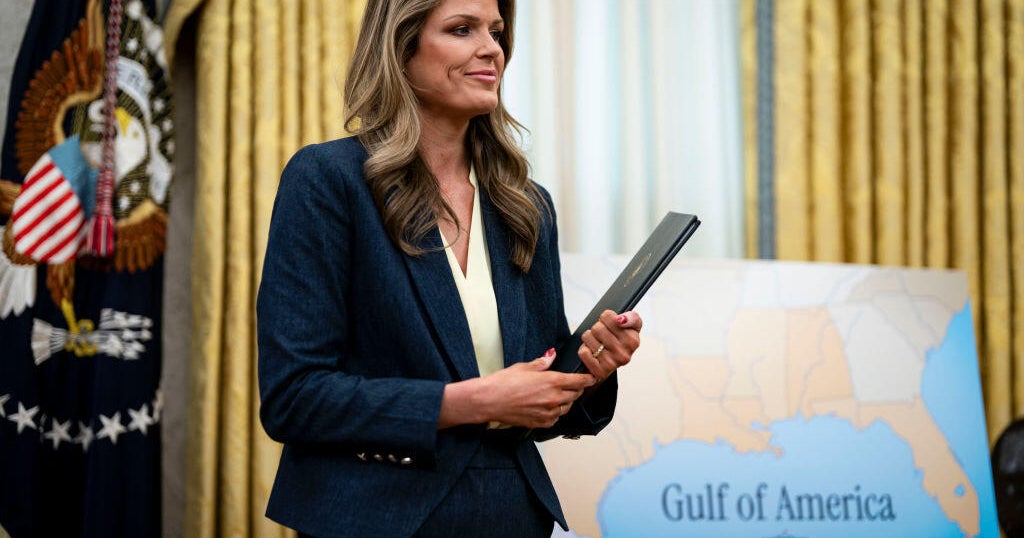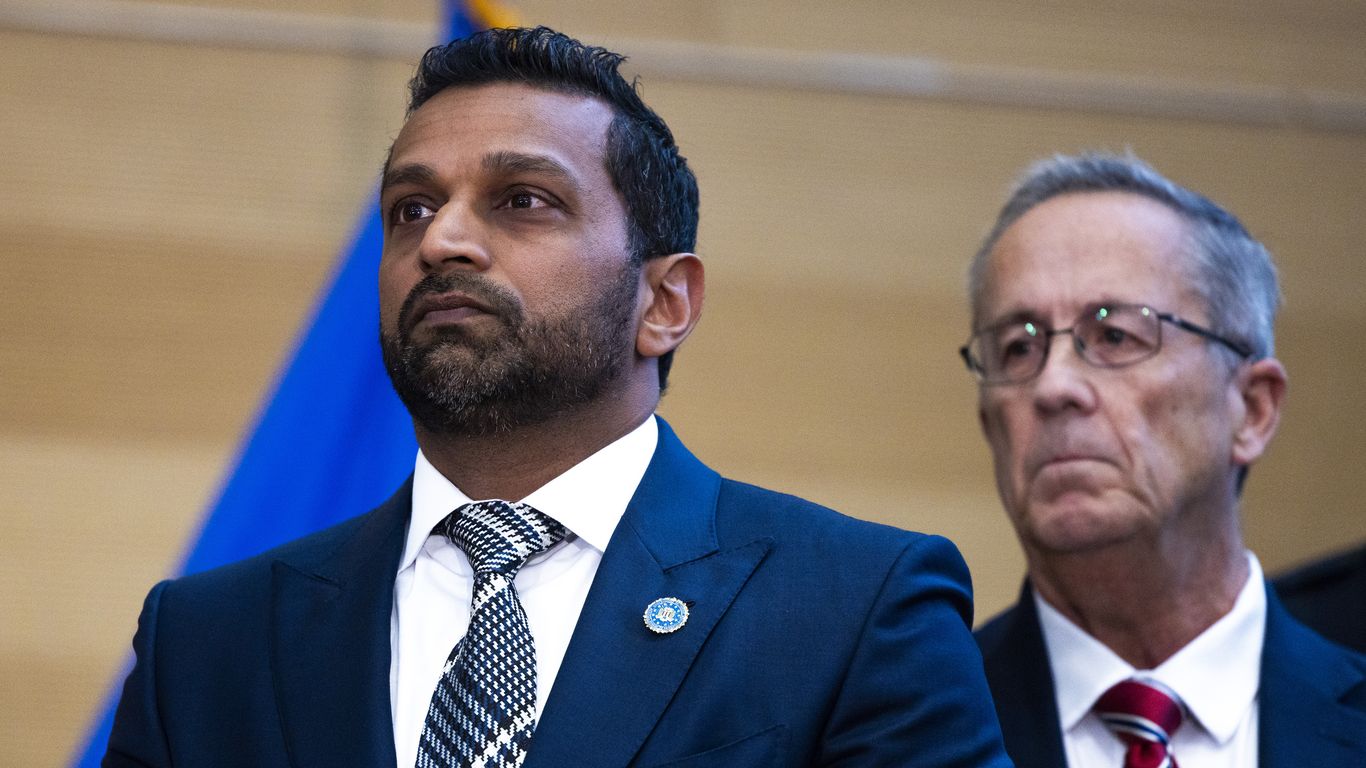Trump Nominates Lindsey Halligan as Top Federal Prosecutor for Virginia Office
#trump #lindsey_halligan #federal_prosecutor #virginia #justice_system

Introduction
In a recent announcement, President Trump nominated Lindsey Halligan, a senior White House aide, to serve as the top federal prosecutor for the Virginia office. This comes as a replacement for the acting U.S. attorney who was in charge of investigating New York State Attorney General Letitia James.
Key Details
Halligan has been a part of the Trump administration since its inception and has been a key figure in many controversial decisions. This includes the recent investigation into Letitia James, who has been a vocal critic of the president. The nomination of Halligan is seen by some as a strategic move to protect the president's interests and maintain control over the investigation.
Impact
The nomination of Halligan has raised concerns about the independence and integrity of the justice system. The timing of the announcement, just weeks before the election, has also been met with skepticism. If confirmed, Halligan's role as the top federal prosecutor could have significant implications for the investigation and the outcome of the elections.
About the People Mentioned
President Trump
Donald John Trump, born June 14, 1946, in Queens, New York, is an American businessman, media personality, and politician who has served as the 45th and 47th president of the United States. He graduated from the University of Pennsylvania's Wharton School with a degree in economics in 1968 and took over his family’s real estate business in 1971, renaming it the Trump Organization. Over decades, he expanded the company’s holdings into skyscrapers, hotels, casinos, and golf courses, building a high-profile brand often associated with luxury and real estate development. Trump also gained fame as the host of the reality TV show *The Apprentice* from 2004 to 2015[1][3][7]. Trump entered politics as a Republican and won the presidency in 2016, defeating Democrat Hillary Clinton in an unexpected victory. His tenure from 2017 to 2021 was marked by significant policy shifts, including tightening immigration controls, imposing a travel ban on several Muslim-majority countries, expanding the U.S.–Mexico border wall, rolling back environmental regulations, implementing major tax cuts, and appointing three Supreme Court justices. His foreign policy included withdrawing the U.S. from international agreements on climate change and Iran’s nuclear program, and initiating a trade war with China. Trump's handling of the COVID-19 pandemic was widely criticized for downplaying the virus's severity. After losing the 2020 election to Joe Biden, he challenged the results, culminating in the January 6, 2021, Capitol attack. Trump was impeached twice but acquitted both times by the Senate[1][2]. In a historic political comeback, Trump was re-elected and inaugurated for a second non-consecutive term on January 20, 2025, becoming the oldest president to assume office at age 78. He remains a highly influential and polarizing figure in American politics[2][7]. Trump is married to Melania Trump, with whom he has one son, Barron, and has four adult children from previous marriages. He has authored several books, including *The Art of the Deal*, a business bestseller[3][5][7].
Letitia James
Letitia James is the 67th Attorney General of New York State, serving since 2019. She is the first woman and the first woman of color elected to this statewide office in New York. A native of Brooklyn, James earned her undergraduate degree from Lehman College and her law degree from Howard University School of Law. Prior to becoming Attorney General, she served as New York City’s Public Advocate from 2013 to 2019, where she was also the first woman of color to hold citywide office. In that role, she transformed the office into a powerful force for legislative change, addressing issues such as the gender wage gap by banning salary history questions in hiring and advocating for vulnerable populations including children in foster care and tenants[2][4]. As Attorney General, James acts as the chief legal officer of the state, focusing on protecting New Yorkers through law enforcement and civil rights advocacy. Notably, she secured a $7.4 billion settlement from Purdue Pharma and the Sackler family for their role in the opioid crisis, with New York receiving up to $250 million to fund treatment and prevention programs. Her office has also recovered over $3 billion from opioid manufacturers and distributors to combat the epidemic. James leads efforts to hold corporations accountable, exemplified by forcing DoorDash to pay $16.75 million to workers after unfair tip practices were exposed. She is also active in legislative initiatives such as the FAIR Business Practices Act, aimed at protecting consumers and small businesses from abusive practices[1][6]. James remains a prominent figure in New York politics and law enforcement, known for her advocacy on public safety, civil rights, and corporate accountability, continuing to address major social and legal challenges affecting New Yorkers.
About the Organizations Mentioned
Trump Administration
The **Trump Administration** refers to the executive branch of the United States government under President Donald J. Trump, covering two non-consecutive periods: his first term from 2017 to 2021 and his second term beginning in 2025. As an organization, it is responsible for executing federal laws, shaping public policy, and managing national affairs during its tenure. During the **first Trump Administration (2017–2021)**, the administration pursued a wide-ranging agenda focused on immigration reform, economic nationalism, deregulation, judiciary appointments, and foreign policy shifts. Key actions included building and expanding the U.S.-Mexico border wall—completing 458 miles by January 2021—and implementing strict immigration policies such as travel bans from several predominantly Muslim countries and rescinding the DAPA amnesty program[2]. The administration withdrew the U.S. from the Trans-Pacific Partnership trade deal, renegotiated NAFTA into the USMCA, and signed the "Buy American and Hire American" executive order to prioritize American workers[1][3][5]. Judicially, Trump appointed three Supreme Court justices—Neil Gorsuch, Brett Kavanaugh, and Amy Coney Barrett—significantly influencing the federal judiciary with over 200 judicial appointments[5]. The administration also focused on military expansion, combating ISIS, addressing the opioid crisis, and responding to the COVID-19 pandemic with vaccine development support[5]. Foreign policy was marked by controversial decisions including troop withdrawals from northern Syria, reinforced support for Saudi Arabia, and tensions with Iran and North Korea[4]. The administration faced two impeachments: first in 2019 over Ukraine dealings and again in 2021 following the January Capitol riot; Trump was acquitted by the Senate both times[4][5]. After losing the 2020 election, Trump returned for a **second term starting in 2025**, continuing his policy priorities with new regulatory changes and political appointments[6][8]. The Trump Administration
White House
The **White House Office** is a central organizational component within the Executive Office of the President of the United States (EOP), tasked with supporting the President in managing day-to-day operations, policy formulation, and political affairs. It is headed by the White House Chief of Staff and staffed by senior aides who report directly to the President, including those with titles such as Assistant to the President and Deputy Assistant to the President. These staff members are mostly political appointees without the need for Senate confirmation, allowing the President considerable discretion in shaping the office to suit each administration's priorities[1]. Historically, the White House Office was established in 1939 through Reorganization Plan 1 and Executive Order 8248 to provide immediate assistance to the President. It functions as the nerve center for presidential staff, physically located primarily in the West Wing, and plays a pivotal role in managing the President’s policy agenda, communications, and political strategy. Its flexible organization allows each President to tailor the staff composition and roles according to their governance style and objectives[1]. In the current context of 2025, the White House Office operates under the administration of President Donald J. Trump, who returned to office after the 2024 election. His administration emphasizes rejecting prior policies deemed extremist and focuses on enhancing quality of life, economic growth, and American energy dominance. The administration includes Vice President JD Vance and First Lady Melania Trump, among others, with a Cabinet advising on various governmental functions[4][6]. Recent initiatives linked to the White House’s operational sphere include the establishment of a new **Department of Government Efficiency (DOGE)** aimed at modernizing federal technology and software to boost government productivity. The DOGE agenda is implemented through the renamed United States DOGE Service within the Executive Office, reflecting a concerted push to leverage technology for administrative modernization[5]. Notably, the White House Office also coordinates national security and homeland security functions through the National Security Council staff, underscoring its central role
New York State Attorney General
The New York State Attorney General (NY AG) is the chief legal officer and guardian of the legal rights of New Yorkers, their organizations, and natural resources. The office enforces laws to protect consumers, tenants, patients, workers, investors, and charitable donors, while promoting economic and social justice and public health strategies. It also preserves the state’s environment and coordinates statewide civil and criminal investigations, including those related to organized crime and Medicaid fraud[2]. Historically, the office dates back to colonial times with evolving powers. Initially, the NY AG was the chief public prosecutor and civil solicitor, but as the state grew, local district attorneys were created in 1796 to handle prosecutions in districts outside New York City, which remained under the Attorney General’s prosecution until the 19th century. The office’s constitutional and statutory powers have developed through common law and legislation over the centuries, reflecting New York's complex legal needs[1][4][7]. Currently, the NY AG’s office employs over 1,700 staff, including over 700 assistant attorneys general, and operates multiple divisions such as Criminal Justice, Solicitor General, State Counsel, Social Justice, and Administration. These divisions handle a wide array of legal activities, from criminal enforcement and real estate to civil litigation and appeals[2]. Letitia James, the 67th Attorney General, is notable for being the first woman of color elected to statewide office in New York and the first female NY AG. Since taking office, she has secured over $7.5 billion in settlements and judgments, and has been active in fighting for social justice, consumer protection, and holding powerful entities accountable, becoming a prominent figure in legal and political circles[3][5]. The NY AG office remains a critical institution in New York’s governance, balancing law enforcement, consumer rights advocacy, and environmental protection, with significant influence on business and technology sectors through its regulatory and legal actions.


















